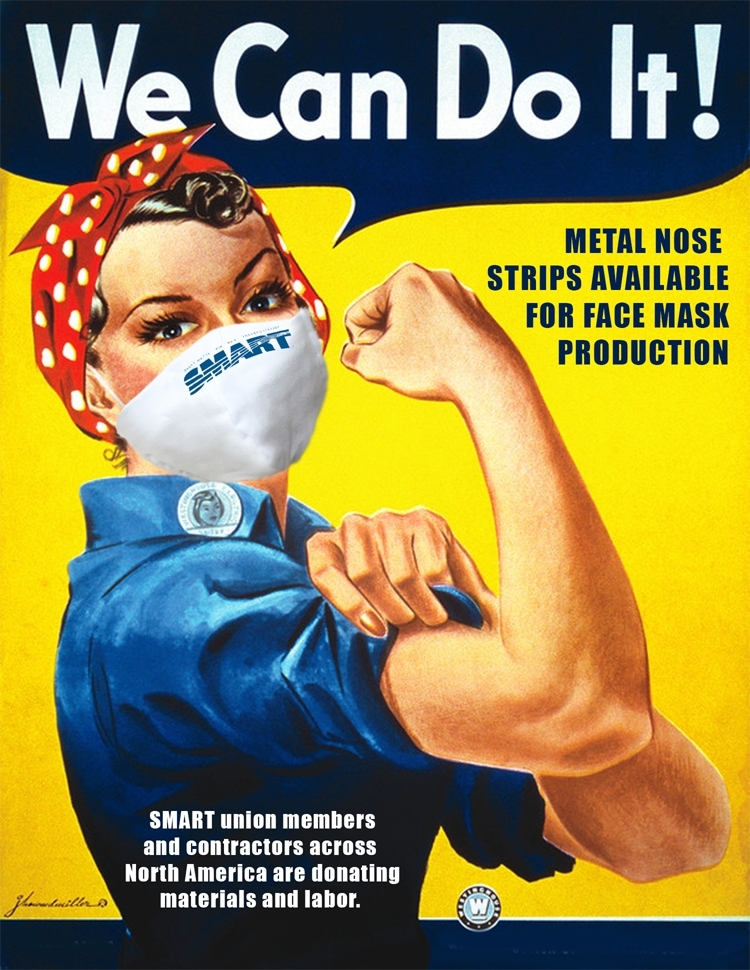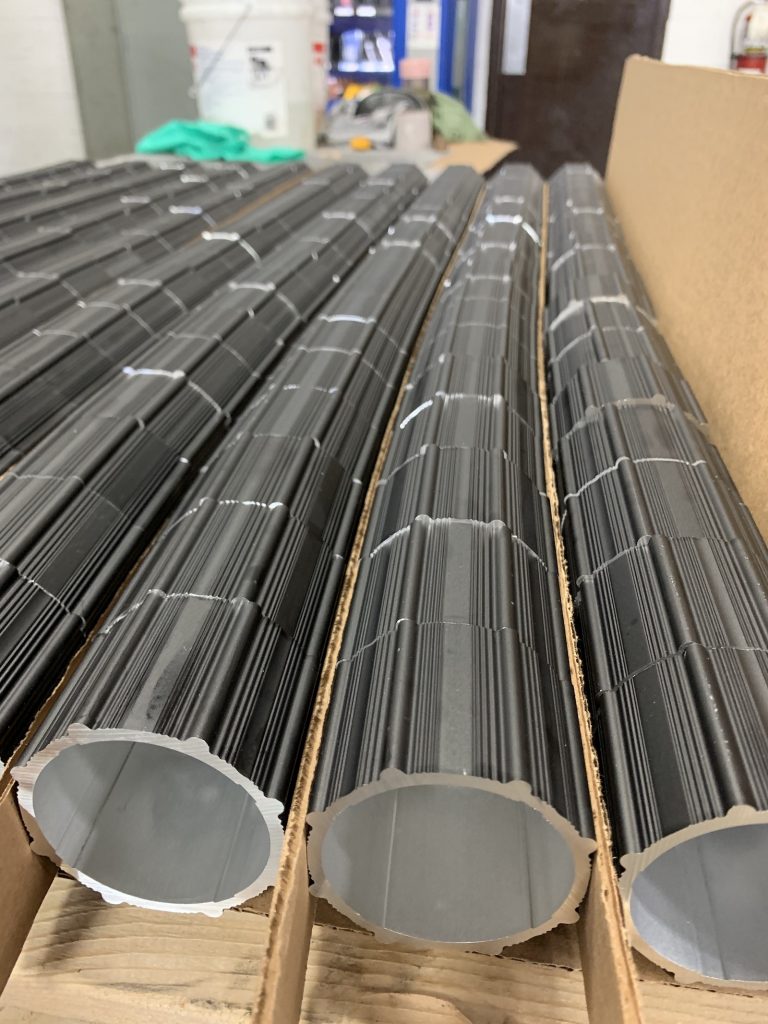Publisher’s Note: Light Metal Age has seen the aluminum industry go through a number of challenges during our 78 years of publication. The response has always been the same. The aluminum industry rises to whatever the challenge may be with thoughtful ingenuity born from working with the metal in all of its forms in service to mankind. The magazine is dedicated to continue to serve and support this very special fraternity detailing new improvements in production, processing, and fabrication as well as the industry’s response to any new challenge.

In the few months since 2020 began, the world has been faced with a growing crisis. The novel coronavirus (COVID-19) has swept far and wide, with cases being reported in nearly every country across the globe. Governments have implemented measures, such as shelter-in-place or stay-at-home orders, to protect their citizens—having a dramatic and immediate impact on the worldwide economy.
The aluminum industry is one of the many industries that has been affected by the current situation. The most immediate effect was the cancelation or postponement of many industry events. However, as time has gone on, the impact has grown, with some operations being forced to slow or even close production due to shelter-in-place orders, decreased demand, and disrupted supply streams. However, even in the face of these challenges, many aluminum businesses are working to support their communities in order to help everyone get through this crisis together.
Essential Industry
As shelter-in-place orders began to roll across a number of U.S. states in March, the Aluminum Association released a report titled, “American Aluminum Jobs: Essential to the Nation.” The aim was to provide a framework for policymakers developing economic stimulus and other programs in response to the COVID-19 pandemic. The document underscores the essential nature of all U.S. aluminum production and calls for a number of measures to support the industry during the ongoing public health crisis—including designating it as an “essential” industry by state, local, and federal governments as they consider any upcoming or ongoing shelter-in-place orders.
“The aluminum industry provides a number of products that will be essential to the nation in the coming weeks and months,” said Tom Dobbins, president and CEO of the Aluminum Association. “From building material for emergency facilities and critical infrastructure to antimicrobial medical equipment to packaging for food, beverage, hygiene, and other products, aluminum is a key part of any disaster response effort. We are requesting clear guidance from federal, state, and local authorities that the industry is exempt from any orders that could potentially disrupt supply chains.”
The Aluminum Extruders Council (AEC), the Aluminum Anodizers Council (AAC), and the Aluminum Recyclers Council (ARC) have all issued statements supporting the Association’s assessment regarding the value of the aluminum industry. “The aluminum extrusion industry stands ready to assist in this time of emergency that our country faces,” said Jeff Henderson, president of the AEC. “The members of the AEC are hard working, resilient and compassionate. They want to be part of the solution and not be relegated to the sidelines in this most critical time in our country.”
On March 28th, the U.S. Department of Homeland Security issued an “Advisory Memorandum on Identification of Essential Critical Infrastructure Workers During COVID-19,” which defines what is determined critical infrastructure. This includes workers in metals manufacturing (including aluminum and steel) that produce products for medical, transportation, energy, communications, food and agriculture, and other necessary supply chains. Under these guidelines, many aluminum extruders and other semis producers would be deemed essential. However, whether an aluminum company is considered essential can vary as each operation falls under different U.S. state guidelines.
Those aluminum companies that are remaining open are faced with the challenge of keeping their workers healthy and safe during these trying times. Many companies are adding formal or informal policies on sick time and hygiene. A variety of new measures and safety protocols are being implemented, including adopting virtual meetings (where possible), additional disinfection measures, the use of enhanced personal protective gear (including latex gloves and masks), employee temperature checks, and alternating shift patterns to limit face-to-face interaction between employees.
Economic Impact
In the wake of the novel coronavirus, the aluminum industry has begun to see signs of slowing in a number of markets. A significant shift came when automakers and aerospace manufacturers in the U.S. and Europe began to cut back production. In its Aluminium Products report for April, CRU forecasted a 10% drop in North American passenger vehicle output, projecting a 9% decline in demand for aluminum rolled products and an 11% decline in extrusions. On the aerospace side, with air traffic down and a number of aircraft OEMs suspending production, CRU forecasts a demand drop of more than 12% for rolled products. With these current demand losses, a number of aluminum companies have reported plans to curtail or temporarily close some of their operations across the U.S. and Europe, including Aleris, AMAG, Arconic, Constellium, Gränges, Hydro, Novelis, and others.
CRU also reported that the building and construction activity across the U.S. was mixed, as some states have halted all non-emergency construction work. Changes to this market have a bigger impact on extruders (representing 37% of all demand) than on rolling mills (only 11% of demand). However, most extruders have been relatively unimpacted so far. CRU expects that demand loss in the construction sector will be only temporary, with a recovery expected in spring 2021.
Some sectors are remaining steady (packaging and can sheet) or seeing a spike in demand (medical equipment). However, CRU expressed concern that this may not be enough to offset other demand losses. How quickly the economy and industries such as aluminum will take to recover is unclear. The answer may lie in how long it takes to contain the virus and relax social distancing measures, allowing employees to return to work.
The Aluminum Association is currently conducting a survey on the economic impact of COVID-19 on the aluminum industry. The results of the first edition of the survey show the negative impact (between 21-50%) on participants’ domestic operations, with respondents expecting only a slight improvement over the next three months.

The AEC has also published the results of its impact and implementation survey regarding the COVID-19.
Supporting the Fight
Medical care workers and other personnel are on the front lines of this crisis—treating patients, seeking cures for the virus, and providing the services required to keep communities healthy and strong. One of the main challenges has been a shortage of medical and other necessary equipment required by hospitals and their staff. Aluminum companies have been stepping up and working to support this fight during these difficult times by expediting the production of critical components and/or donating services or funds.
Almag Aluminum
Having a number of medical industry customers, Almag, headquartered in Brampton, Canada, has ramped up production of extruded components for those sectors. This includes extrusions for ventilator housings (pictured), structural tubing for hospital beds, telescoping profiles for tables used to accommodate patients, and temporary partitions for field hospitals. “With the current global situation we have consciously shifted our focus to support the medical industry,” said Rob Nelson, vice president of sales and marketing at Almag. “We are centering our attention on high-priority items to ensure the fastest delivery of medical supplies and equipment.”
While many of the products that Almag is extruding are existing profiles, the company is also working on the development of profiles for new innovative and lifesaving designs. “Currently, we are able to expedite new tools in-house within 2-3 business days,” said Nelson. “On some projects, we have been able to acquire a new tool, extrude, fabricate, finish, and ship all within one week.”

Bonnell Aluminum
Headquartered in Newnan, GA, Bonnell is currently extruding, fabricating, and finishing parts for use in FEMA tents, temporary hospital structures, hospital beds and equipment, makeshift isolation centers, food processing, emergency response facilities, pharmaceutical manufacturing, and water management facilities.
“Given the wide range of products we make that are critical to our nation’s infrastructure, we have a huge responsibility to support the demand for essential products intended to flatten the curve of the COVID-19 coronavirus,” said Brook Hamilton, president of Bonnell. “Our leadership team has been focused on making our company as responsive as possible to meet the demand for these essential products.”
Hydro Extruded Solutions
Hydro has increased the manufacture of extruded medical components at its facility in Cressona, PA. “We are making and expediting orders to produce aluminum extrusions used to make components for medical equipment—ventilators, hospital bed frames, analyzer chassis for coronavirus test kits, medical gas (oxygen) carts, parts to manufacture MRIs, etc,” Michael Hammer, operations manager at Cressona told the Republican Herald. In addition, the site also manufactures extrusions for emergency response and key infrastructure equipment, such as electrical conductors and conduits.
Thumb Tool & Engineering
Thumb Tool, a division of the Gemini Group located in Bad Axe, MI, has been supporting the production of ventilators through the supply of extrusion dies for the manufacture of critical components. When tasked with this challenge, the operation responded by being able to design, produce, and ship the die in only four days.
“This is less than half the traditional lead time customarily necessary,” said Anthony A. Trecapelli, executive vice president, Gemini Group, in a discussion with the Huron Daily Tribune. “The Thumb Tool & Engineering team demonstrated world class performance on a very special project serving a very special purpose at a very difficult time.”
SMART
The International Association of Sheet Metal, Air, Rail and Transportation Workers (SMART) is collaborating with union contractors to produce and donate aluminum nose strips for the millions of masks being made by volunteer groups across the country. The thin and flexible aluminum strips are critical to custom-fitting the top of a mask to a user’s face, making them more effective, less likely to slip off, and more comfortable to wear.
The project began when Hillery Company, a custom metal fabrication shop located in Groton, CT, was asked by a local nurse to make the strips so they could be sewed into cotton masks. Since then, the company has mailed out more than 500 packages containing over 40,000 metal nose strips. When the sheer volume of requests became too much for one company to handle, Hillery requested support from SMART, who responded immediately, opening up the project to all sheet metal union contractors. The aluminum strips are being used by various volunteer groups to produce N95 (rated to filter out 95% of airborne particles) and N99 (rated to filter out 99%) masks, which will be delivered to health care workers and first responders across the U.S.
Alcoa
Alcoa has received an increased number of requests for charitable contributions to assist with healthcare and/or social service work related to the pandemic. In response, Alcoa Foundation has allocated $4 million (or 70% of its budget) to provide grants in its local communities, in addition to a $1 million coronavirus relief fund.
Editor’s Note: This article first appeared in the April 2020 issue of Light Metal Age. To receive the current issue, please subscribe.
